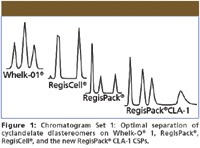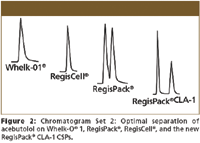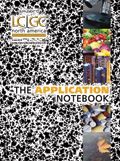Evaluating a New Chlorinated Polysaccharide Chiral Stationary Phase for Improved Selectivity: The RegisPack CLA-1
Polysaccharide-based chiral stationary phases (CSPs) and Pirkle-type CSPs are often successful in achieving a majority of analytical and preparative chiral separations.
Ted Szczerba, Regis Technologies, Inc.
Polysaccharide-based chiral stationary phases (CSPs) and Pirkle-type CSPs are often successful in achieving a majority of analytical and preparative chiral separations. However, there are a few cases in which these proven chiral selectors lead to partial, poor, or no separation at all. The new RegisPack® CLA-1 addresses some of these issues.
This study used three well-established CSPs (Whelk-O® 1, RegisPack®, RegisCell®) and the new RegisPack® CLA-1. All phases were based on 5-micron silica.

Figure 1
The Whelk-O® 1 (a Pirkle-type CSP) is based on 1-(3,5-dinitrobenzamido)-1,2,3,4-tetrahydrophenathrene.
The RegisPack® and RegisCell® are coated with tris-(3,5-dimethylphenyl) carbamate of amylose and tris-(3,5-dimethylphenyl) carbamate of cellulose, respectively.
The new chlorinated RegisPack® CLA-1 is coated with tris-(5-chloro-2-methylphenyl) carbamate of amylose.
This study used two compounds that were previously difficult to separate on existing CSPs. We explored the possibility of baseline resolving the diastereomers of cyclandelate, and to achieve a baseline separation of acebutolol. Although we achieved partial separation, we were not able to fully resolve these two compounds on existing CSPs. The new RegisPack® CLA-1 was able to help us with this problem. Following are some chromatograms that show excellent baseline separation of our test compounds.

Figure 2
Conclusion
The Whelk-O® 1, RegisPack®, and RegisCell® CSPs are well-established phases that do a superior job of separating the majority of compounds submitted for chiral screening. There are cases where these CSPs can only achieve partial or no separation on some analytes. The new RegisPack® CLA-1 exhibits unique selectivity in separation when existing CSPs fail.

Regis Technologies, Inc.
8210 Austin Ave, Morton Grove , IL 60053
tel. (847)583-7661; fax (847)967-1214
Email: teds@registech.com, Website: www.registech.com/chiral/

SEC-MALS of Antibody Therapeutics—A Robust Method for In-Depth Sample Characterization
June 1st 2022Monoclonal antibodies (mAbs) are effective therapeutics for cancers, auto-immune diseases, viral infections, and other diseases. Recent developments in antibody therapeutics aim to add more specific binding regions (bi- and multi-specificity) to increase their effectiveness and/or to downsize the molecule to the specific binding regions (for example, scFv or Fab fragment) to achieve better penetration of the tissue. As the molecule gets more complex, the possible high and low molecular weight (H/LMW) impurities become more complex, too. In order to accurately analyze the various species, more advanced detection than ultraviolet (UV) is required to characterize a mAb sample.














